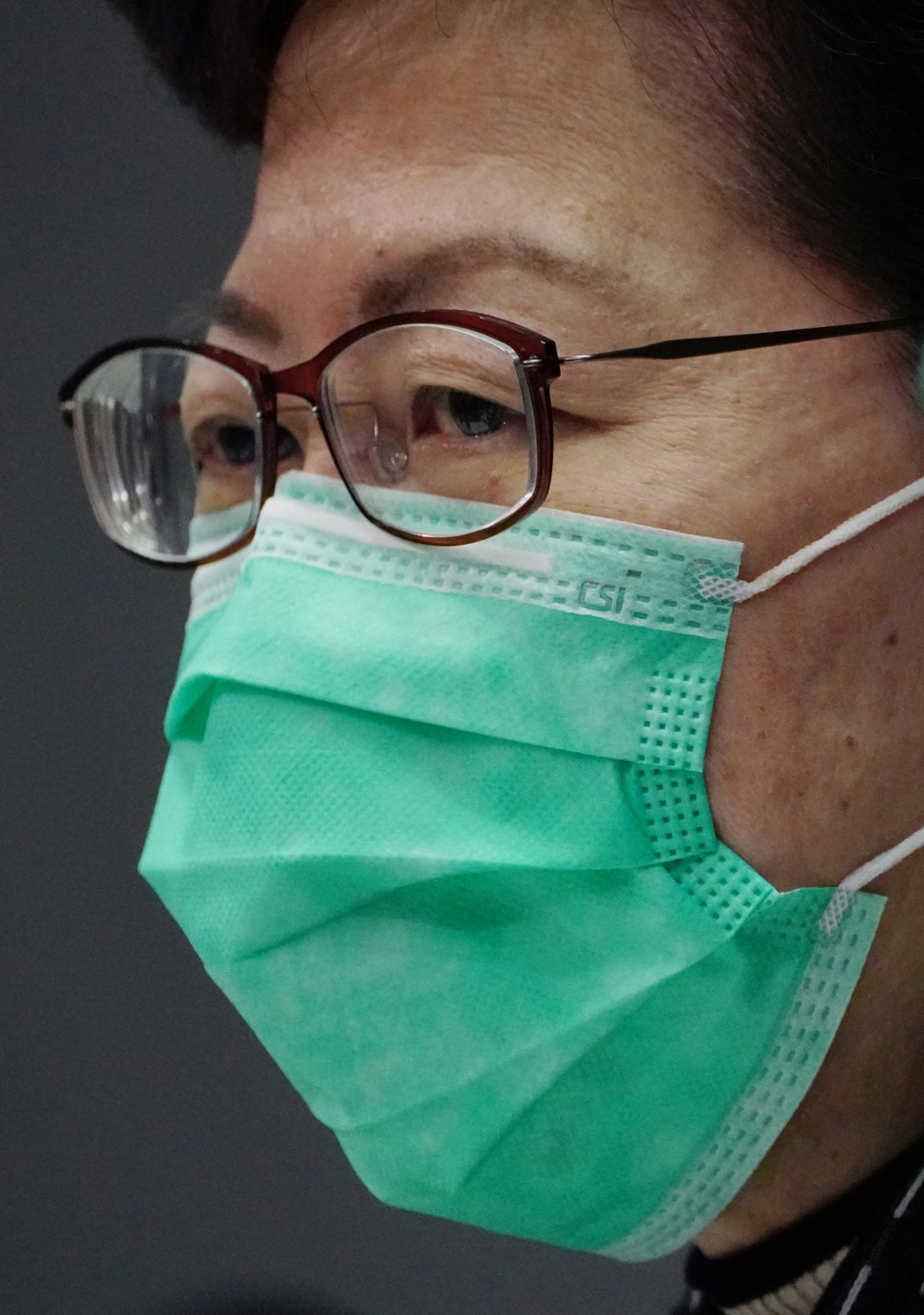China coronavirus: tens of millions of masks on way to Hong Kong and prisoners will work around the clock to make more as city confirms its 12th case
- Chief Secretary Matthew Cheung says more than 32 million masks to be available for public as queues snake around shops selling limited and overpriced stocks
- Cheung also confirms inmates at Lo Wu Correctional Institution will work around the clock to boost mask production

Hong Kong authorities promised an increasingly anxious and agitated public yesterday that tens of millions of masks were on their way to help protect them from the rapidly advancing Wuhan coronavirus, and even that prison inmates would be working around the clock to manufacture more.
Chief Secretary Matthew Cheung Kin-chung, the No 2 official, said more than 32 million masks would be made available for public use, as frustrated residents formed snaking queues around shops selling limited and overpriced stocks.
“I’m sure that in the next few days more masks will be available on the market,” he said.
With 12 people confirmed as being infected by the coronavirus in the city and more suspected cases cropping up, the government was under intense public and political pressure to order a total shutdown of Hong Kong’s borders with mainland China, where the pneumonia-like illness that first emerged in Hubei’s provincial capital has killed 170 people and hospitalised more than 7,000 so far.
As mainland China confirmed infections in all 31 provinces, municipalities and autonomous regions, and alarmed countries ramped up efforts to pull their nationals out, the World Health Organisation was also besieged by calls to declare the epidemic a global emergency.
South Korea, India, the Philippines and Finland confirmed new cases of the coronavirus, which has not proved as deadly but is spreading faster than the Sars virus that killed more than 600 people worldwide in 2002-03.
While the Hong Kong government has ordered a partial closure of the city’s borders and turned away thousands of Hubei residents trying to get in, it is still keeping major crossings open because of huge numbers of Hongkongers returning home from the Lunar New Year holiday.
A group of more than 400 public hospital doctors, nurses and other health care professionals joined the chorus of calls for a full border closure, demanding immediate action in a strongly-worded letter to the government.
Hospital Authority chairman Henry Fan Hung-ling echoed similar concerns, urging more decisive steps immediately to further reduce the flow of people between Hong Kong and the mainland, and ensure the supply of masks.
A 79-year-old Hong Kong ID card holder suspected of having contracted the virus and under isolation orders absconded from Tseung Kwan O Hospital, adding to fears about more infections in the community.
In different parts of the city, thousands of residents stood in long queues for hours in the cold to snap up precious boxes of masks that some retailers were able to source.
As shops ran out of stock quickly, they were besieged by angry customers demanding more and police had to be called to a Watsons’ outlet in Tin Shui Wai after some men began kicking the storefront and shouting abuse at a member of staff.
The shortage of masks would affect frontline health care, Hong Kong Medical Association president Ho Chung-ping warned, citing cases of doctors concerned about running private clinics without protection.
The chief secretary appealed for calm, saying the government was “leaving no stone unturned” to source and ramp up supplies.
“The government asked Hong Kong manufacturers on the mainland to boost production, and so far we have worked with mainland authorities in facilitating the delivery of nearly 8 million masks for private retail,” Cheung said, adding that he expected them to go on sale soon.
“In addition to that, we are arranging, also with mainland authorities, for more than 24 million to be shipped for private retail … We will protect the people’s safety at all costs.”
The government’s overseas economic and trade officers had bought an additional 5 million masks to be sent to the city, as demand had soared sixfold at public hospitals, he said.
The Hospital Authority’s existing stock of masks could last for up to three months, but the Government Logistics Department – which distributes to law enforcement and social welfare bodies among others – was down to its last month, Cheung revealed.
“It’s not just a problem for Hong Kong or China. In fact it’s a global issue. Even the WHO recognises that the shortage of masks hits many, many countries in the world … it’s a question of market forces, supply and demand,” he said.
Cheung confirmed a Post report that Hong Kong’s prison authority would have inmates making masks around the clock from Monday, boosting production by 55 per cent to 70,000 per day.
About 60 inmates at Lo Wu Correctional Institution – a maximum-security prison for female adult inmates and remands – can produce around 45,000 masks daily for government departments.
A government source said some inmates had volunteered to work overnight in the factory and their wages as well as meal arrangements would be looked at accordingly.
University of Hong Kong microbiologist Dr Ho Pak-leung earlier estimated the city would use about 300 million surgical masks monthly to cope with the crisis.
Looking at Singapore, where the government is giving out free masks to each household, many are questioning why Hong Kong is not doing the same. Others have suggested giving local residents priority, limiting the number of masks being bought at a time, and capping retail prices.
But Secretary for Commerce and Economic Development Edward Yau Tang-wah said such moves would not be practical.
“Most of the buyers have been Hong Kong people. If we impose restrictions on the buyers’ identity, it can be difficult to enforce. The problem can be solved more easily by ensuring the supply,” he said.
